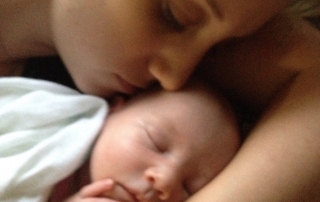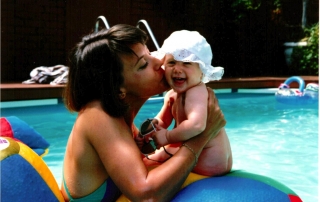BLOG
More Guidelines for Grandparents
With my burgeoning experience as a grandparent and the response to the recent 'Six Guidelines for Grandparents' ( www.babydoc.com.au/six-guidelines-grandparents/ ) I’ve thought of a few more, which I hope will help the older generation tread the fine line of assisting the new parents without interfering. 1) Names. You named your babies, now leave it to them to name theirs. If they want to call him T-Kool…. smile, nod and don’t say a word! 2) Always ask the mother whether you can touch or pick up the new baby. As a grandparent you don’t have the right [...]
Six Guidelines for Grandparents
Behold Georgy and baby Lara. On the 15th December 2014 I became a grandfather. Little Lara came into the world and I can now stop secretly worrying about things totally out of my control… With this new qualification and experience, I feel it is an appropriate time to contribute some guidelines: 1) Just because it happened to you, doesn’t mean it will happen to your daughter. So many times I hear remarks like “Well I couldn’t breastfeed you, so you’ll probably have problems too”. This is unhelpful. 2) Bring food and cleaning equipment, not advice (unless it’s asked for). [...]
Why Breasts are Attractive (To Babies)
At birth our breasts secrete a fluid that smells similar to amniotic fluid. It is this smell that attracts our babies to our breast. So how do we get that smell on our breasts after birth?
There is no connection between Autism and Vaccination
There is no connection between Autism and Vaccination
Happy Father’s Day
I have two lovely daughters now both grown up (and married recently to wonderful guys). There remains nothing so delightful as hearing them chatting together and screaming with laughter. Sometimes it’s watching a video of me falling over or trying to walk through a glass door, and sometimes they are reviewing the movies they made of each other as teenagers.The most important ingredient of childhood, after safety, shelter, food …. is laughter. Keep it light, keep it quirky and don’t take life too seriously at home. The world outside is serious enough. Here’s a shortened excerpt from “Your Cherished Baby” about [...]
Boundaries for the Bigger Baby
I think Dr Michael Carr-Gregg makes an important point (though somewhat indelicately) in his recent interview with the ABC: http://www.abc.net.au/news/2014-08-23/crap-australian-parents-raising-a-generation-of-spoilt-brats/5691638 I have a bit to say about this issue in "Your Cherished Baby". This is a short excerpt from the chapter on toddlers...... Young babies cannot be spoilt. For the first few months they rely on their carers so completely that it is hard to imagine a baby being cared for too much. The baby’s the boss and needs absolute security in all aspects of his life, and there is no danger in him learning ‘bad’ habits. As one year approaches [...]
Chickenpox vaccination works well.
Anyone who is in any doubt about the value and effectiveness of chickenpox (varicella) vaccination should read the article published in Paediatrics journal this week.
Meningococcal type B: An effective vaccine at last!
A new meningococcal vaccine was approved by the TGA last year. This month the Australian Technical Advisory Group on Immunisation has put out a recommendation about it. The present meningococcal vaccine already on the immunisation schedule is effective against serotype C, but this one is effective against the much more common serotype B. The Disease: Invasive meningococcal disease (IMD) is a really nasty disease and is the leading cause of meningitis and septicaemia globally. It tends to affect the under 5 year age group (with another peak in adolescence) and particularly attacks infants. The incidence in the under 1 year olds [...]
Babies: Like You and Me
A radio interviewer asked me recently as a baby doctor, how it was possible to know what sick babies needed? For those of us that work in the world of babies, who each day see them emerging wet, pink and screaming, from their mother’s womb, it is easy to forget that, for the ...
Attunement to Your Baby
Human babies are born very immature. They have very little ‘working memory’ and the thinking, planning, evaluating part of their brain is not yet connected up. It will be months before they can learn about altering their patterns of living, like sleeping longer and ...
Helping Babies to Settle
I’m getting confused between how to teach my baby how to “self-settle” and not employing “control crying”. Can you explain the difference, at what age you can start to teach self-settling and the best way to do it? This is a couple of edited excerpts from the chapter on “Sleep” from my new book "Your Cherished Baby" published by Pan Macmillan and released on the 1st August 2014. Read on…… IIt is important to understand that babies up to the age of about six months have almost no ‘working memory’. That means that they can't really ‘learn’ [...]
Mummies and Dummies
TThere was a recent paper in the journal Pediatrics which suggested that parents who, in the first six months of their baby’s life, cleaned their baby’s pacifiers (dummies) by putting them in their own mouth and sucking them, had babies with a decreased incidence of allergic disease, such as eczema, later. This is not the first time that it has been suggested that challenging babies with germs from the environment at an earlier age decreases their likelihood of allergies as they grow. Poverty, overcrowding, large families, animals in the home, and early exposure to germs in food have all been shown [...]







